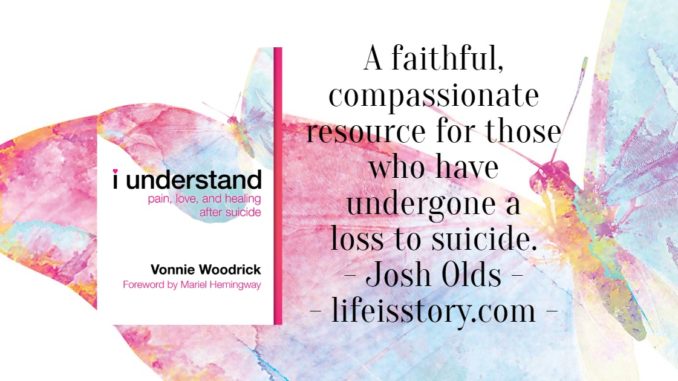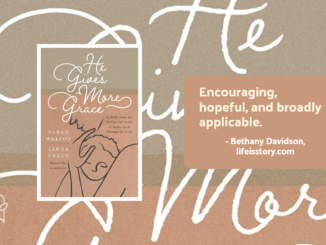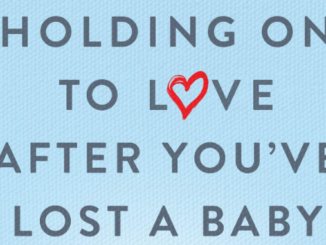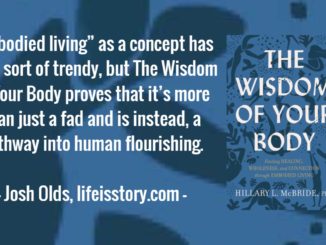
Published by Eerdmans on September 1, 2020
Genres: Non-Fiction, Christian Life
Buy on Amazon
Goodreads

Time doesn’t heal—love heals When Vonnie Woodrick lost her husband Rob to suicide in 2003, she was faced with a series of decisions. How would she move on? How would she support and raise her three children as a young widow? How would she talk about Rob and honor his memory? These questions had no easy answers, but Vonnie found herself longing for one thing in particular: understanding. The stigma of mental illness loomed large over Rob’s death and made healing difficult. But Vonnie found the common assumptions surrounding suicide to be false. Rob was not “crazy.” He did not choose to take his own life. He was in agony and only wanted the pain to end. His death was a direct result of his mental illness. Why didn’t more people understand this? Over a decade later, Vonnie and her children created the nonprofit organization i understand to help others enduring this same grief and loneliness. Since its founding in 2014, i understand has become a haven of compassionate comfort and a powerful voice in the movement to change the way we talk about suicide so that it can be seen for what it truly is: a terminal effect of mental illness, rather than a deliberate choice. This is the story of how love transformed Vonnie’s brokenness into hope—not only for herself and her family, but for anyone struggling to emerge from the darkness of suicide.
It is likely that, in some way, your life has been touched by suicide. For some, it was a family member. For others, a friend or a family member’s friend. And we can all recite the litany of celebrities deaths from Kurt Cobain to Robin Williams. One of the first funerals I ever performed as a pastor was for the father of a former youth group member who succumbed to his mental illness.
I Understand: pain, love, and healing after suicide is about the living, about picking up the pieces and moving forward, about understand the root cause of suicide, about forgiving, about grieving, and about changing the conversation in how we talk about suicide.
It’s that last part that I found personally most instructive and has led to a change in the way I talk about suicide. If you’ve read closely, you’ve maybe already noticed. Suicide is the end result of mental illness. When someone dies of cancer, we don’t say “he killed himself,” we say “cancer killed him.” Why should it be any different for suicide, which—in the vast majority of cases—comes after an extended battle with mental illness?
That was Vonnie Woodrick’s story. Her husband, Rob, was a very successful businessman. Their family had a well-known name and money to spare. The future seemed bright. But Rob’s struggle with anxiety and depression continued to deepen as, for all his success, he did not feel successful. One day, that mental illness became too much and it killed him. The illness killed him. The mental brokenness is what did it. That’s a paradigm-shifting aspect of the conversation that will help readers change the way they think about, deal with, and counsel those with suicidal ideation or family members of those killed by suicide.
I Understand is a very personal book, something that is obvious by the personal title. The book begins with a letter that Vonnie wrote to friends and family a couple months after Rob’s death. It ends with reflections from Vonnie and Rob’s children and how they have processed their father’s death as they’ve grown. The oldest is my age—thirty-one—with his father’s death sixteen years in the past and you can viscerally tell how it still affects him. The other two write with their struggle of growing up without a father and coming to terms with his mental illness. It’s a heart-wrenching, intimate portrait of an entire family that’s been devastated by suicide and found healing in the years afterward.
For anyone who has a close member die from mental illness, I Understand is simply that: a book that assures you that you are not alone. Woodrick gives you a path forward. A path toward a new understanding. A path toward healing. A path toward peace. Woodrick’s book also comes from her non-profit of the same name that was founded based on the following ideals:
- i understand suicide is an effect of an illness
- i understand mental illnesses are treatable
- i understand stigma is the #1 reason why someone would not seek treatment for mental illness; education and awareness are vital to saving and changing lives
- i understand reaching out to those who are suffering could save a life; let someone know you are available and treat them with respect and compassion
- i understand most people who are suicidal do not want to die; they want their pain to end
- i understand speaking out about suicide may empower others to share their stories
- i understand feelings of guilt are part of the grieving process on the way to finding peace and acceptance
- i understand those who die by suicide do make it to heaven
Woodrick breaks through the stigma and speaks out of her own trauma with the hope of helping others find healing. I Understand is a faithful, compassionate resource for those who have undergone a loss to suicide.



